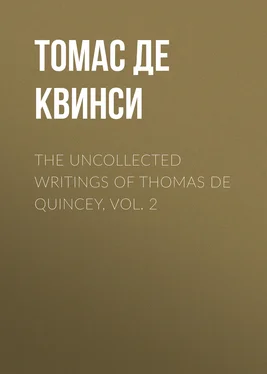Томас Де Квинси - The Uncollected Writings of Thomas de Quincey, Vol. 2
Здесь есть возможность читать онлайн «Томас Де Квинси - The Uncollected Writings of Thomas de Quincey, Vol. 2» — ознакомительный отрывок электронной книги совершенно бесплатно, а после прочтения отрывка купить полную версию. В некоторых случаях можно слушать аудио, скачать через торрент в формате fb2 и присутствует краткое содержание. Жанр: foreign_prose, literature_19, foreign_antique, на английском языке. Описание произведения, (предисловие) а так же отзывы посетителей доступны на портале библиотеки ЛибКат.
- Название:The Uncollected Writings of Thomas de Quincey, Vol. 2
- Автор:
- Жанр:
- Год:неизвестен
- ISBN:нет данных
- Рейтинг книги:3 / 5. Голосов: 1
-
Избранное:Добавить в избранное
- Отзывы:
-
Ваша оценка:
- 60
- 1
- 2
- 3
- 4
- 5
The Uncollected Writings of Thomas de Quincey, Vol. 2: краткое содержание, описание и аннотация
Предлагаем к чтению аннотацию, описание, краткое содержание или предисловие (зависит от того, что написал сам автор книги «The Uncollected Writings of Thomas de Quincey, Vol. 2»). Если вы не нашли необходимую информацию о книге — напишите в комментариях, мы постараемся отыскать её.
The Uncollected Writings of Thomas de Quincey, Vol. 2 — читать онлайн ознакомительный отрывок
Ниже представлен текст книги, разбитый по страницам. Система сохранения места последней прочитанной страницы, позволяет с удобством читать онлайн бесплатно книгу «The Uncollected Writings of Thomas de Quincey, Vol. 2», без необходимости каждый раз заново искать на чём Вы остановились. Поставьте закладку, и сможете в любой момент перейти на страницу, на которой закончили чтение.
Интервал:
Закладка:
[Macbeth. Scene 7.
'Thus even-handed justice
Commends the ingredients of our poison'd chalice
To our own lips.'
Cor. proposes, Returns the ingredients of, &c.; and, after the word returns is placed a comma; which, however, I suppose to be a press oversight, and no element in the correction. Meantime, I see no call for any change whatever. The ordinary use of the word commend , in any advantageous introduction of a stranger by letters, seems here to maintain itself—namely, placing him in such a train towards winning favour as may give a favourable bias to his opportunities. The opportunities are not left to their own casual or neutral action, but are armed and pointed towards a special result by the influence of the recommender. So, also, it is here supposed that amongst several chalices, which might else all have an equal power to conciliate notice, one specially—namely, that which contains the poison—is armed by Providence with a power to bias the choice, and commend itself to the poisoner's favour.
[ Ibid.
Will I with wine and wassail so convince .'
Cor. is not happy at this point in his suggestion: tinkers are accused (often calumniously, for tinkers have enemies as well as other people) of insidiously enlarging holes, making simple into compound fractures, and sometimes of planting two holes where they find one. But I have it on the best authority—namely, the authority of three tinkers who were unanimous—that, if sometimes there is a little treachery of this kind amongst the profession, it is no more than would be pronounced 'in reason' by all candid men. And certainly, said one of the three, you wouldn't look for perfection in a tinker? Undoubtedly a seraphic tinker would be an unreasonable postulate; though, perhaps, the man in all England that came nearest to the seraphic character in one century was a tinker—namely, John Bunyan. But, as my triad of tinkers urged, men of all professions do cheat at uncertain times, are traitors in a small proportion, must be perfidious, unless they make an odious hypocritical pretension to the character of angels. That tinkers are not alone in their practice of multiplying the blemishes on which their healing art is invoked, seems broadly illustrated by the practice of verbal critics. Those who have applied themselves to the ancient classics, are notorious for their corrupt dealings in this way. And Coleridge founded an argument against the whole body upon the confessedly dreadful failure of Bentley, prince of all the order, when applied to a case where most of us could appreciate the result—namely, to the Paradise Lost . If, said Coleridge, this Bentley could err so extravagantly in a case of mother-English, what must we presume him often to have done in Greek? Here we may see to this day that practice carried to a ruinous extent, which, when charged upon tinkers, I have seen cause to restrict. In the present case from Macbeth , I fear that Cor. is slightly indulging in this tinkering practice. As I view the case, there really is no hole to mend. The old meaning of the word convince is well brought out in the celebrated couplet—
'He, that's convinc'd against his will,
Is of the same opinion still.
How can that be? I have often heard objectors say. Being convinced by his opponent— i. e. , convinced that his opponent's view is the right one—how can he retain his own original opinion, which by the supposition is in polar opposition. But this argument rests on a false notion of the sense attached originally to the word convinced . That word was used in the sense of refuted; redargued , the alternative word, was felt to be pedantic. The case supposed was that of a man who is reduced to an absurdity; he cannot deny that, from his own view, an absurdity seems to follow; and, until he has shown that this absurdity is only apparent, he is bound to hold himself provisionally answered. Yet that does not reconcile him to his adversary's opinion; he retains his own, and is satisfied that somewhere an answer to it exists, if only he could discover it.
Here the meaning is, 'I will convince his chamberlains with wine'— i. e. , will refute by means of the confusion belonging to the tragedy itself, when aided by intoxication, all the arguments (otherwise plausible) which they might urge in self-defence.
[' Thrice and once the hedge-pig whined:'—
This our friend Cor. alters to twice ; but for the very reason which should have checked him—namely, on Theobald's suggestion that ' odd numbers are used in enchantments and magical operations;' and here he fancies himself to obtain an odd number by the arithmetical summation— twice added to once makes thrice. Meantime the odd number is already secured by viewing the whines separately, and not as a sum. The hedge-pig whined thrice—that was an odd number. Again he whined, and this time only once—this also was an odd number. Otherwise Cor. is perfectly right in his general doctrine, that
'Numero Deus impare gaudet.'
Nobody ever heard of even numbers in any case of divination. A dog, for instance, howling under a sick person's window, is traditionally ominous of evil—but not if he howls twice, or four times.
['I pull in resolution.'— Act V. Scene 5.
Cor. had very probably not seen Dr Johnson's edition of Shakspere , but in common with the Doctor, under the simple coercion of good sense, he proposes 'I pall ;' a restitution which is so self-attested, that it ought fearlessly to be introduced into the text of all editions whatever, let them be as superstitiously scrupulous as in all reason they ought to be.
[Hamlet. Act II. Scene in the Speech of Polonius.
'Good sir, or so, or friend, or gentleman,'
is altered by Cor., and in this case with an effect of solemn humour which justifies itself, into
'Good sir, or sir, or friend, or gentleman;'
meaning good sir, or sir simply without the epithet good , which implies something of familiarity. Polonius, in his superstitious respect for ranks and degrees, provides four forms of address applying to four separate cases: such is the ponderous casuistry which the solemn courtier brings to bear upon the most trivial of cases.
At this point, all at once, we find our sheaf of arrows exhausted: trivial as are the new resources offered for deciphering the hidden meanings of Shakspere, their quality is even less a ground of complaint than their limitation in quantity. In an able paper published by this journal, during the autumn of 1855, upon the new readings offered by Mr Collier's work, I find the writer expressing generally a satisfaction with the condition of Shakspere's text. I feel sorry that I cannot agree with him. To me the text, though improved, and gradually moving round to a higher and more hopeful state of promise, is yet far indeed from the settled state which is desirable. I wish, therefore, as bearing upon all such hopes and prospects, to mention a singular and interesting case of sudden conquest over a difficulty that once had seemed insuperable. For a period of three centuries there had existed an enigma, dark and insoluble as that of the Sphinx, in the text of Suetonius. Isaac Casaubon had vainly besieged it; then, in a mood of revolting arrogance, Joseph Scaliger; Ernesti; Gronovius; many others; and all without a gleam of success.
The passage in Suetonius which so excruciatingly (but so unprofitably) has tormented the wits of such scholars as have sat in judgment upon it through a period of three hundred and fifty years, arises in the tenth section of his Domitian. That prince, it seems, had displayed in his outset considerable promise of moral excellence: in particular, neither rapacity nor cruelty was apparently any feature in his character. Both qualities, however, found a pretty early development in his advancing career, but cruelty the earliest. By way of illustration, Suetonius rehearses a list of distinguished men, clothed with senatorian or even consular rank, whom he had put to death upon allegations the most frivolous: amongst them Aelius Lamia, a nobleman whose wife he had torn from him by open and insulting violence. It may be as well to cite the exact words of Suetonius: 'Aelium Lamiam (interemit) ob suspiciosos quidem, verum et veteres et innoxios jocos; quòd post abductam uxorem laudanti vocem suam—dixerat, Heu taceo ; quòdque Tito hortanti se ad alterum matrimonium, responderat μη και συ γαμησαι θελεις;'—that is, Aelius Lamia he put to death on account of certain jests; jests liable to some jealousy, but, on the other hand, of old standing, and that had in fact proved harmless as regarded practical consequences—namely, that to one who praised his voice as a singer he had replied, Heu taceo ; and that on another occasion, in reply to the Emperor Titus, when urging him to a second marriage, he had said, 'What now, I suppose you are looking out for a wife?'
Читать дальшеИнтервал:
Закладка:
Похожие книги на «The Uncollected Writings of Thomas de Quincey, Vol. 2»
Представляем Вашему вниманию похожие книги на «The Uncollected Writings of Thomas de Quincey, Vol. 2» списком для выбора. Мы отобрали схожую по названию и смыслу литературу в надежде предоставить читателям больше вариантов отыскать новые, интересные, ещё непрочитанные произведения.
Обсуждение, отзывы о книге «The Uncollected Writings of Thomas de Quincey, Vol. 2» и просто собственные мнения читателей. Оставьте ваши комментарии, напишите, что Вы думаете о произведении, его смысле или главных героях. Укажите что конкретно понравилось, а что нет, и почему Вы так считаете.












